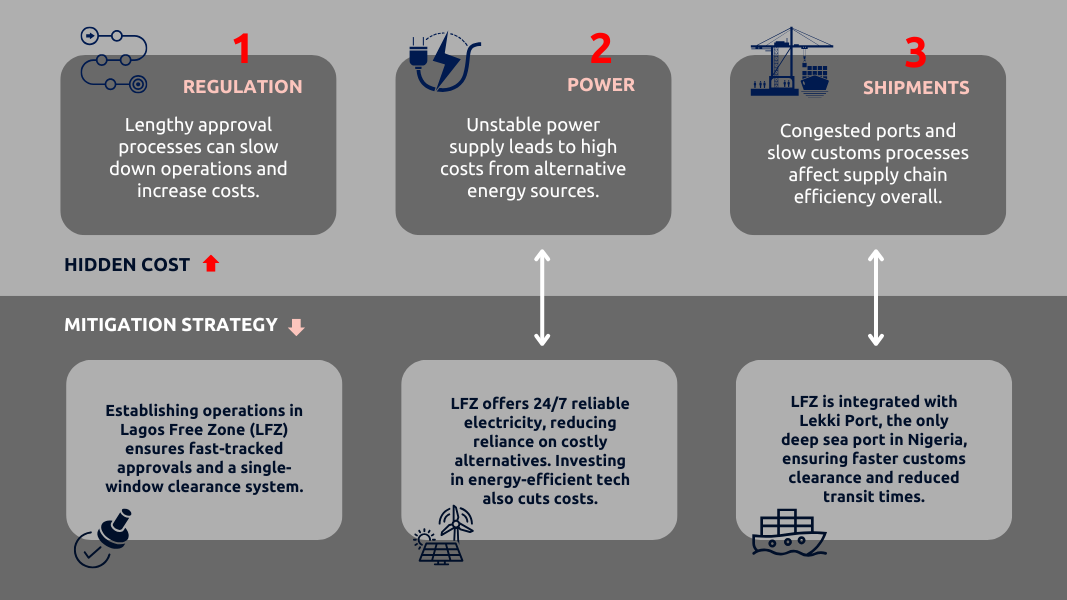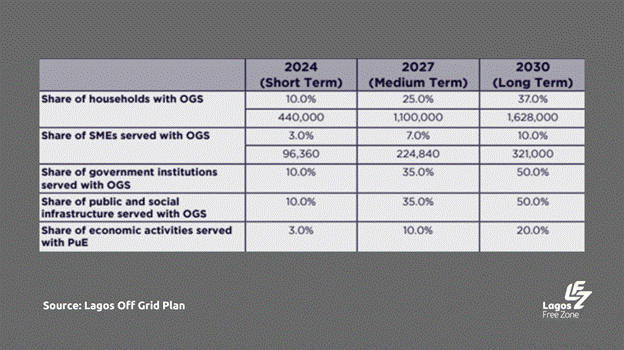6 Hidden Costs of Manufacturing in Emerging Markets (And How to Manage Them)
01 May, 2025
The expansion of global manufacturing operations into emerging markets (source: imf.org) such as Cambodia, Mexico or Nigeria, comes with benefits like reduced labour costs, access to new consumers, cheaper production inputs and more. While there are various factors that may impact profitability and efficiency if not considered ahead of time, here are six often overlooked practical strategies to mitigate these factors as you consider Lagos, Nigeria, as your next expansion destination.

1. Regulatory Delays
The regulatory landscape in emerging markets can be complex and time-consuming. Bureaucratic red tape, inconsistent enforcement, and evolving legal frameworks often lead to delays in obtaining necessary permits and approvals. These setbacks can lead to postponed production schedules and increased costs.
Mitigation Strategy: In Lagos, local legal experts assist with compliance efforts and help companies establish relationships with regulatory bodies. Operating within a Free Trade Zone (FTZ) like the Lagos Free Zone (LFZ) streamlines processes, as its customer support team offers simplified processes and expedited approvals. LFZ provides single-window clearance for business registrations and Customs, reducing administrative hurdles and errors.

Nigeria Stock Exchange street | Source: George Osodi/Bloomberg
2. Energy Costs
Unreliable power supply is a prevalent issue in many emerging markets, leading manufacturers to rely on alternative, independent energy sources such as diesel and gas generators, which significantly increase operational expenses compared to the national grid power. However, a more stable and reliable power supply is becoming a reality for manufacturers in Nigeria, particularly in Lagos, thanks to significant government reforms and targeted investments (source: thisdaylive.com).
Mitigation Strategy: Manufacturers can capitalise on these improvements by establishing operations in industrial zones like LFZ, with dedicated power infrastructure, ensuring access to reliable and cost-effective, 24/7 energy solutions. Investing in energy-efficient technologies and integrating renewable energy sources can further optimize costs and ensure sustainability.

Lagos State Off-Grid Electrification Strategy (OGS) Targets
3. Port Inefficiencies
Congested ports and inefficient Customs procedures can lead to prolonged clearance times, demurrage charges, and disrupted supply chains. This is common in many emerging markets, affecting the timely delivery of raw materials, and consequently, finished goods.
Mitigation Strategy: Partner with logistics providers experienced in local port operations to navigate this effectively. Facilities near efficient ports are also advantageous. The Lagos Free Zone is integrated with the Lekki Deep Sea Port, one of Africa’s largest and the only deep sea port in Nigeria. Lekki Port enhances logistical efficiency and reduces transit times for manufacturers, especially for those operating within the zone.

Long Shot Within the Lagos Free Zone with the Lekki Deep Seaport in the Horizon | Source: Nanyang Technological University
4. Local Content Policies
Many emerging markets implement local content policies (source: sciencedirect.com) requiring foreign companies to source a percentage of materials or labour locally. While the aim is to boost local economies, these policies can pose challenges if local suppliers lack the capacity or quality standards required. Nigeria stands out with its abundant raw materials and a vast, educated youthful workforce, providing manufacturers with both the resources and talent needed to establish and scale operations.
Mitigation Strategy: Develop relationships with local suppliers and invest in their capacity building to meet quality and volume requirements. Also, companies operating within LFZ can receive support on how to effectively integrate local resources and talent into their operations.

Nigerian Workers in a Manufacturing Plant | Source: Ripples Nigeria
5. Supply Chain Disruptions
Emerging markets often experience infrastructural challenges, political instability, or other factors that disrupt operations and supply chains, leading to security concerns, production delays and increased costs. However, Lagos is a manufacturing and logistics hub with significant infrastructure investments aimed at ensuring safety of goods and personnel while streamlining supply chains.
Mitigation Strategy: Diversify supplier base and maintain buffer inventories to cushion against disruptions. Leveraging the integrated facilities of LFZ, which offers global-standard warehousing and secured shared services, enhances supply chain and operational continuity.

Supply Chain Resilience in Lagos vs. Other Emerging Markets in Africa
6. Compliance with International Standards
Ensuring that products manufactured in emerging markets meet international quality and standards is an area worthy of time and financial investment. A dedicated quality and compliance team is even more critical when working in societies with laxed laws and enforcement practices.
Mitigation Strategy: Invest in quality control systems and certifications to ensure compliance with international standards. LFZ provides access to world-class facilities and support services that facilitate adherence to global manufacturing standards. For example, the Zone supports pharmaceutical companies in maintaining Good Manufacturing Practices (GMP) (source: who.int) by providing an environment in line with international standards.

It is well established that emerging markets offer lucrative opportunities for manufacturing expansion, driven by lower production costs, growing consumer bases, abundant natural resources, and government incentives designed to attract foreign investment. Through the implementation of the above strategic measures, while leveraging specialised zones like the Lagos Free Zone (LFZ), global businesses can mitigate hidden costs that might otherwise threaten this profitability if not addressed.
Related: As a prime emerging market, Lagos is Africa’s powerhouse and solutions incubator for the 21st Century, and here are all the reasons why.


